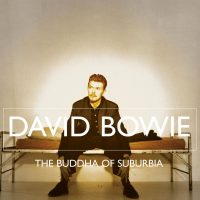 Written by: David Bowie
Written by: David Bowie
Recorded: 1993
Producers: David Bowie, David Richards
Released: 8 November 1993
Available on:
The Buddha Of Suburbia
Personnel
David Bowie: vocals
Erdal Kızılçay: keyboards, synthesizer
Mike Garson: piano
Rob Clydesdale: guitar
Paul Davidson: bass guitar
Danny ‘Isaac’ Prevost: drums
‘Bleed Like A Craze, Dad’ is the fifth track on David Bowie’s album The Buddha Of Suburbia.
Bowie enlisted a British funk-rock group, 3D Echo, to perform on the track; the band were in Mountain Studios in Switzerland at the same time that he was recording the album. They also appeared on the album’s title song.
We were about two weeks into this free time with [producer] David Richards when we had to down tools because we learned that David Bowie was going to be coming in to record the music for this miniseries called The Buddha Of Suburbia. It was set in Ziggy sort of time and our manager Nigel said, ‘Let’s see if we can get you to record with him…’ And we said, ‘Yeah, right…’ We thought we’re just going to be knocking about in Montreux for a couple of weeks. But they said, ‘David’s going to come over tonight; if you could be upstairs jamming, he’ll listen behind the closed door of the live room. If he likes what he hears, you might be able to work on the music for the series.’ We went upstairs and had a bit of a jam and then all of a sudden the door opens and there’s David Bowie, Dave Richards and our manager. We shook hands, he said, ‘Hello, I’m David.’ He was very down to earth, never presumptuous that everybody would know who he was. This was a Sunday and he said, ‘I’m starting on Monday – would you like to turn up to the studio and we’ll get going?’ I’ve got some ideas and we’ll work on some stuff.’We did ‘Bleed Like A Craze, Dad’ – when [in the show] the main guy was crawling through the garden late at night. David said to the bass player, ‘I just want something that goes, ‘Dum der dum dum dum…’ It was probably only about a minute and a half long, I put down some guitar and then he said, ‘Can you do some fills and riffs?’ And so I did that, then he said, ‘Can you play some lead on it?’ So I did and then he said, ‘That’s great, thanks!’ Oh, OK, you mean that’s it? No warming up? It was bang, straight in there. It was first takes for everything pretty much – that’s the way he works. I’ve got friends who are huge Bowie fans, but I’m not really one of them. But he did influence what I’ve done since due to how he worked in the studio. We used to slave away and do loads of takes, and all that went out of the window after that day. And when I heard the final version I just went, ‘Of course. There’s the freshness.’
David Bowie: Ultimate Record Collection (Uncut)
Also on the song was pianist Mike Garson, whose part was recorded in Los Angeles in the summer of 1993, in a three-hour session at O’Henry Sound Studios in Burbank, California.
It was about the creation, it had the same vibe, and even if the music was different it had the same improvisational freshness that I loved about him, and it coincided with my particular talents. He brought the Buddha tapes to LA without me having heard them, he trusted me that much. He worked on the thing for a year and I put all the piano stuff down in three hours.
David Bowie: Ultimate Record Collection (Uncut)
The title ‘Bleed Like A Craze, Dad’ was seemingly intended to evoke the Kray Twins, London gangsters in the 1950s and ’60s. In his sleeve notes for The Buddha Of Suburbia, Bowie wrote “Friends of the Krays” as being part of the “stockpile of residue from the 1970s” that he found inspiration from.
Bowie’s lyrics, meanwhile, are heavy on near-homophones: astral/kestrel, featherfall/pedestal, parlous/parlours, Shirley/Charlie, footnote/footstone. The song also includes the phrase “In the valley of the dead man walks”, a foreshadowing of his 1997 song ‘Dead Man Walking’.
